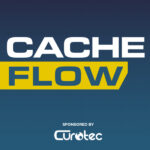Dive into the exhilarating tale of NeuroFlow, a company breaking barriers between mental and physical health through innovation and audacity. From late-night coding for a pitch at South by Southwest to cross-country trips without an overnight bag, the founders navigated fundraising challenges, transforming a vision into a multi-million-dollar business.
Here are a few of the topics we’ll discuss on this episode of Cache Flow Podcast.
- NeuroFlow’s daring demo at SXSW ’17.
- Scaling with a mission-driven approach.
- Tactics for navigating tough funding rounds.
- Strategic growth through significant raises.
- Blending tech with human healthcare goals.
Resources:
Connect with the guests:
Connect with our host, Brian Dainis:
Quotables:
- 24:20 – So it didn’t help, the top line didn’t help the bottom line. What you found was there was a reluctance to pay for stuff like this. Like a therapist would say, why am I gonna do this? Like there’s, I have a line outside the door of people, so the demand with no shortage demand and there’s no incentive to just add this additional work to the table. And that was a, I think a hard lesson for us because we wanted to help these therapists, you know, basically usher them into the 21st century using technology and data the same way every other medical professional is using. But the market just wasn’t ready for that.
- 20:32 – Once you have access, then you have to focus on quality. Are they delivering evidence-based care? So that’s where the measurement-based care side of things comes in and we can talk about that from a NeuroFlow perspective, but now we’re measuring, that’s great. How about identifying people in the first place? Because there’s also lots of challenges around people not self-identifying or not being identified within a greater healthcare system and then tying that into their overall healthcare. So not just treating behavioral health as, okay, great, we’ve identified them, we’ve found them a provider, we know they’re delivering quality care, but we’re gonna have that go treated in a silo. Like if someone has diabetes or obesity or COPD or any of these things, you’re not just looking at that within a vacuum you’re thinking, okay, well how does that relate to your lifestyle? How does it relate to social determinants like access to healthy food, you know, ability to pay for healthcare.
- 32:50 – Last year we identified 33,000 people of high risk of suicide that we were able to intervene with. And I don’t think it’s melodramatic to say like we’ve saved some lives. We, you know, those are 33,000 people that were struggling, many of which were urgent to the point where they had a plan and they felt hopeless. Our technology alerted the health system, our customer so that they were able to reach out in a timely way and get that person to the right level of care. And so that’s what the technology is doing today from a hardware component. The only remnants of that today are we have APIs that integrate with wearables like the Apple Watch and so forth. So if you’re exercising and so forth, that’s a data point that goes into the risk stratification triage engine.
- 52:13 – I don’t think that was ever a good way to run a business, but you know, now it’s certainly not even an option to run it that way anymore. And so we are on a path to, and we think that with our growth trajectory and the stability of our customers, we can sustain ourselves. Now, that’s not to say we won’t raise again because there are strategic reasons that you wanna raise again.
- 45:31 – You know, 141 investors told us no, our first round, I remember one investor, in particular, said, Chris, we love the market. We think BH is a big opportunity. We think you’re solving it in the right way. We just don’t think that you are the right CEO. Wow. I mean that was, that was really hard to hear. But it was, you know, Adam has always been good in terms of anchoring us, going back and saying, okay, look, what could we take from that to learn to get better and to use it moving forward?





